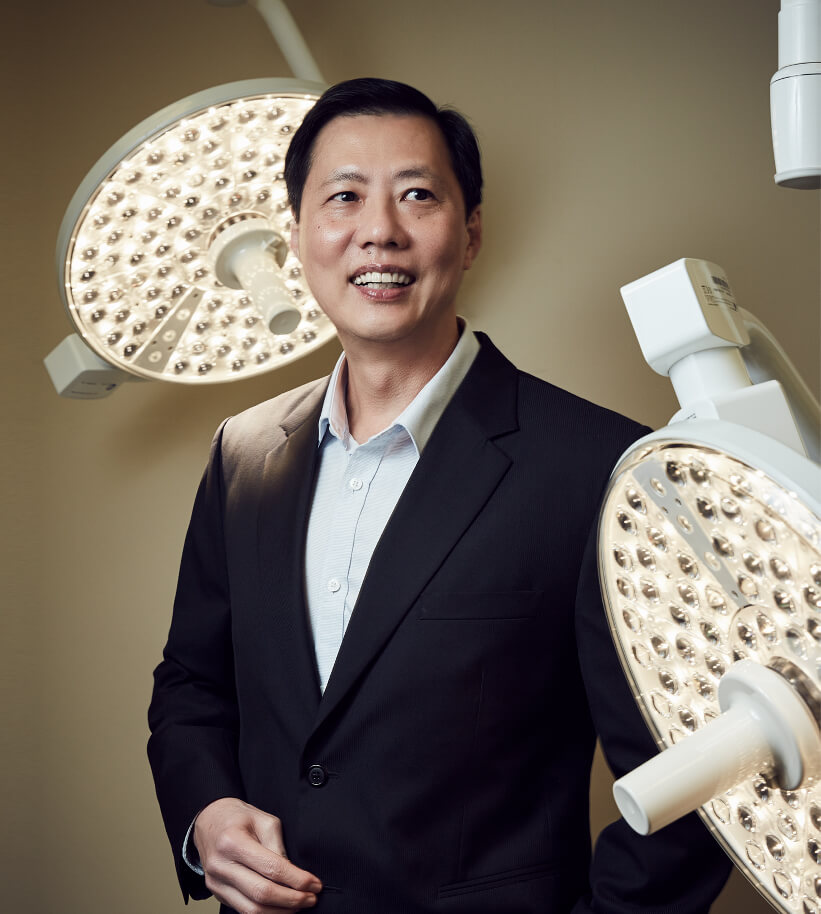
The thyroid is a small gland sited at the base of your neck, just above your breastbone. Thyroid nodules can be solid or fluid-filled lumps that form within your thyroid gland. Most are not serious and do not show symptoms, with thyroid cancer accounting for a small percentage of thyroid nodules.
Since most thyroid nodules don’t show signs or symptoms, it is possible that you will not know that you have one until your thyroid surgeon discovers it during a routine medical examination. There are, however, occasions when a nodule becomes so large that it can be felt or seen, and it could even be pressing on your windpipe and oesophagus (gullet), causing shortness of breath or difficulty swallowing.
“Goitre” is a term used to describe any enlargement of the thyroid gland. A multinodular goitre contains multiple distinct nodules within it.
Lack of iodine in the diet can cause the thyroid gland to develop nodules. But iodine deficiency is uncommon in Singapore as it is routinely added to processed food such as table salt.
At times, your thyroid gland makes and releases more thyroid hormones than your body requires. leading to an overproduction of thyroid hormones or hyperthyroidism. The most common cause of hyperthyroidism is an autoimmune condition called Graves’ disease, when the body’s immune system creates an antibody that causes the gland to make an excessive amount of thyroid hormones. Graves’ disease can be hereditary and usually affects women more than men.
The common ones associated with hyperthyroidism are weight loss, nervousness, irritability, intolerance to warm weather, excessive sweating, hand tremors, heart palpitations and muscle weakness. Patients can sometimes have bulging eyes and experience double vision.
Hashimoto’s Thyroiditis is another autoimmune disorder and can lead to hypothyroidism — a condition that occurs when your thyroid gland does not produce enough thyroid hormones. With Hashimoto’s, your body produces antibodies that attack and destroy the thyroid gland.
Since symptoms of hypothyroidism may be vague and can often mimic other conditions, it is important to get a proper diagnosis from a specialist. The common symptoms associated with hypothyroidism are changes in the menstrual cycle, constipation, depression, dry hair, hair loss, dry skin, fatigue, greater sensitivity to cold weather, slow heart rate and unexplained weight gain.
Most thyroid lumps are not cancerous and it is difficult to tell them apart without further investigations such as a thyroid ultrasound and fine needle biopsy. People exposed to radiation to the head and neck, for example those who have had radiation for previous cancers, face an increased risk of thyroid cancer. The risk becomes greater if the radiation exposure occurred at a younger age.
Thyroid cancers such as medullary thyroid cancers can be familial and are passed on through genes while follicular cancers are prevalent in populations which have a low-iodine diet.
A thyroid nodule is suspected to be cancerous if it continues to grow or cause hoarseness because of impairment of vocal cord function. It can also cause difficulty in swallowing as a large tumour can lead to compression of the oesophagus. However, signs and symptoms of thyroid cancer may not be obvious, especially in the early stages, so it is a good idea to consult a specialist to ascertain if a thyroid lump is cancerous or not.

Senior Consultant Thyroid-Head & Neck Surgeon
MBBS (Singapore), FRCS (Edinburgh),
FRCS (Glasgow), FAMS (ORL)
Prof Goh is a Senior Consultant ENT specialist in Singapore with over 20 years’ experience, both locally and abroad in the UK and Canada under the Health Manpower Development Programme Award and the Singapore General Hospital (SGH) Scholarship.
A respected figure in his field, Prof Goh was the Head of the ENT Department at SGH and a founding member of the Asian Society of Head & Neck Oncology. Passionate about training up future ENT doctors, he teaches at the Duke-NUS Medical School and serves as Chairman on the Residency Advisory Committee at the Ministry of Health. A recipient of numerous service awards, Prof Goh’s dedication to his patients and the advancement of his field cannot be overstated.